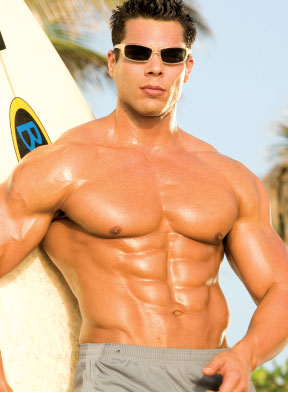 Anthony Presciano is one of those unknown guys you see in all the bodybuilding and fitness publications. I say unknown because although he’s in many ads, he hasn’t been profiled in the magazines and hasn’t been on the competition circuit recently. Anthony has been featured in many advertisements for BSN products, both in magazines and at BSNonline.net. He’s got the kind of well-muscled athletic physique a lot of guys aspire to, so I decided to give IRON MAN readers a chance to find out how he trains, eats and supplements to achieve his results.
Anthony Presciano is one of those unknown guys you see in all the bodybuilding and fitness publications. I say unknown because although he’s in many ads, he hasn’t been profiled in the magazines and hasn’t been on the competition circuit recently. Anthony has been featured in many advertisements for BSN products, both in magazines and at BSNonline.net. He’s got the kind of well-muscled athletic physique a lot of guys aspire to, so I decided to give IRON MAN readers a chance to find out how he trains, eats and supplements to achieve his results.
I have to admit that I was pleasantly surprised by Anthony. He’s an intelligent, articulate upbeat guy who represents his company with class. Although he’s relatively young, he’s had some very notable coaches and has a wealth of useful training and nutrition knowledge. So grab a pen and paper, sit down, get comfortable and take notes. Anthony is about to lay all his cards on the table.
DY: How did you get started in bodybuilding?
AP: I was born in Cleveland, Ohio, but I grew up in Texas and New Mexico. My family owned auto dealerships and saw some opportunities in New Mexico, so we moved there. I first picked up weights for football at age 14. At 19, after one season of NCAA football at the University of New Mexico, I shifted my training efforts toward competitive bodybuilding.
DY: What was your weight training for football like?
AP: Our strength coach was from Notre Dame—a little 4’10” dynamo of a girl. She was a fireplug drill sergeant. [Laughs] Her coaching produced awesome strength gains for all of us. I got my best-ever raw [no bench shirt], natural bench press to 440 and my best-ever natural squat to 585 for six reps. One of my friends and teammates was Brian Urlacher, who went on to become a linebacker for the Chicago Bears.
The coach was awesome! We had 16 guys benching over 400 pounds raw in college and three benching over 500 pounds raw. We were one of the strongest divisional teams in the country. We generally weight trained for about 45 minutes four to five days a week on basic compound movements—cleans, standing presses, chins, rows, squats, stepups, barbell curls, dips. We did sets of three to five reps and trained bodyparts twice a week.
DY: Dang, it must have been crazy to have such great coaching as a base for entering bodybuilding.
AP: It was. I got big and strong. I had a football player’s body—lots of muscle—but I lacked the aesthetics needed for bodybuilding.
DY: How did you make the transition?
AP: I came to the realization that I could be very good at football but not among the elite. Then I heard that one of my inspirations from “Pumping Iron,” Serge Nubret, was living in New Mexico and training at a local gym. I sought him out and asked if he would train me. I believe that was around 1997.
DY: I’ve seen Serge train—when he lived here in Redondo Beach, California, for a while— and I’ve been interacting with him on Ironage.us just recently. He’s a great guy and willing to answer any questions about training and diet. What happened when you worked with him?
AP: My first workout with Serge was chest, calves and abs. It lasted
2 1/2 hours! I went home feeling like I’d been hit by a truck. I have to tell you, that workout owned me. I was scared to go back. Seriously. After all the years of football training, I wasn’t sure if I could handle Serge’s workouts. They were intense, fast-paced and long.
DY: But you went back and took the challenge, right?
AP: Yes, I did. With Serge you don’t handle as heavy a weight, but you do lots of sets and reps with very short rest periods. He’d have me doing 2,000 crunch situps every workout. It was brutal. I developed a blood blister on my tailbone. We also did isolation exercises, which I had never done before, and we did the basics but for many more sets than I had been used to.
DY: Two thousand crunch situps a day? What were the results?
AP: My waist went in three or four inches; my body totally changed. I went from a bulky, blocky football player body to a more aesthetic and shapely bodybuilder look. I competed in several WABBA events, and in 2000, I competed in Europe. I was fifth in the world, 21 and under.
DY: How long did that transformation take?
AP: It was six months to a year.
DY: What are your stats today?
AP: I’m 5’10”, 28 years old, and I weigh between 218 and 222 pounds for contests or shoots. Off-season I weigh between 232 and 242 pounds.
DY: Besides bodybuilding and being a spokesperson and model for BSN, what else are you involved in?
AP: I’m actually one of the directors at BSN. In particular I work to build new relationships and strengthen existing ones between the company and its ever growing customer base. As a spokesperson, my job is to communicate BSN’s message to the general public.
I’m also involved in employee development. I visited a lot of campuses this year, as BSN has grown from 20 to more than 100 employees in less than a year. We help maintain and increase organizational health and employee morale within the BSN corporate doors. Obviously, I’m partial, but BSN just might be the best place in the world to work!
DY: It sounds like a rewarding and challenging career. Do you balance all that work and training by playing other sports or engaging in other hobbies?
AP: I was good at football, wrestling and karate during my adolescence. Now my hobby is simply to become a sponge to my surroundings and experiences—all the while hoping to gain more knowledge.
My spare time is spent with my girlfriend and my golden retriever. Soon it will be filled with more family. My parents will be moving here to Florida from Texas shortly. Nevertheless, anything that I can do to become better equipped to handle life’s challenges would be my hobby; an example would be the most recent series of educational books I have found. The author is Patrick Lencioni, and I think that everyone should read one of his books at some point.
DY: Bodybuilding requires a lot of discipline. It’s as much a mental game as a physical one. What keeps you motivated for your training and diet?
AP: My reputation. That’s the key. A man is only as good as his reputation. Credibility speaks, and I pride myself on the fact that I’m one of the few fitness models who walk around in the off-season at 240 pounds and throw up four plates on the bench and five to six plates on squats for several reps. I can be as flexible as need be with any “look” my job demands. For instance, prior to BSN’s signing Ronnie Coleman, you could find my ads in just about every bodybuilding magazine around. After Ronnie jumped onboard in early 2005, we easily grabbed the market’s attention and took BSN brand awareness to an entirely new level.
I must now focus my efforts on creating a physique that is desired by a different crowd, hence the ads are now found in more fitness-related magazines. I prefer the latter, mainly because I like to stay lean all year.
DY: Talking about getting and staying lean, what’s your diet strategy?
AP: You would be surprised. I eat very little while dieting. It’s almost impossible for me to drop to the weight necessary if I eat any carbs! I find myself indulging in foods that are readily available in the area where I live—downtown Fort Lauderdale, Florida. It’s very easy to grab a high-quality piece of fish and greens. For instance, I just had some amazing steamed sea bass with a side of asparagus. Basically, you can count on me eating chicken and fish with all sorts of vegetables every day until I’m at the bodyfat and weight desired.
Oh, I almost forgot: Flaxseed oil is key for me, to the tune of about four tablespoons per day.
DY: Wow, that’s strict. Do you have a cheat day to break the monotony?
AP: No, I can’t afford it. I eat protein bars, higher-carbohydrate shakes, rice and potatoes when I feel zoned out. Save your cheat days for the off-season. When it’s time to get shredded, there’s no room for error. Serge Nubret built that attitude into me.
DY: Let’s get more specific. How about a sample schedule of your eating for a day.
AP: Sure. I’m actually working with Hany Rambod, who now works with all of our athletes here at BSN. The numbers for the food options represent servings and serving sizes. [See Presciano’s diet on page 198.]
DY: Can you explain a little more about why you take specific nutrients at specific times?
AP: Take a look at the carbohydrate servings, for example. There’s a pattern—-a simple hourly dropoff of total carbohydrate consumption. Eventually, as the shoot nears, we adjust to a carbohydrate cycle in which there are four or five very-low-carb days along with a few high-carb days each week. Protein remains consistent but changes to all fish and Lean Dessert Protein shakes once we’re within 20 days of the shoot. At that point my fat content will come mainly from omega-3, -6 and -9 fatty acids.
DY: What’s your favorite supplement and why?
AP: Nitrix. It’s the greatest supplement in the world because it’s the most versatile. Show me someone with fitness goals, and I’ll show you someone who can benefit from supplementing with Nitrix.
DY: How can people get advice on the best way to use it based on their own specific goals and needs?
AP: Their best bet is to trust my team of AFPA Certified Sports Nutrition consultants. Although I don’t maintain a personal client base, you’ll find me working with each of my consultants on a regular basis. Currently, my staff works with athletes in 10 professional sports in the United States and more than 1,200 direct clients for sport-specific supplementation guidance and program development.
DY: How do you overcome training plateaus?
AP: I go 180 degrees away from what I was most recently doing. If you want to break through a plateau, go from heavy to light, from a few reps to many, from circuit to single-part training, etc.
DY: What are your goals in bodybuilding and fitness?
AP: To be the most appreciated and respected figure in the industry. I know that I can accomplish that because everything is reciprocal. My life is about treating people a particular way, and usually I can make legitimate friendships. I enjoy meeting people from all walks of life and feel that I can learn from each person I come in contact with. Having a sense of humility can go a long way.
DY: What mental or visual principles do you use?
AP: I visualize my last look and try to build on it. Honestly, I use very little additional mental or visual stimulation.
DY: Any observations about life you’d like to share?
AP: “Never strive for success. Strive to be the best, and success will follow.” I’m proud to say I wrote that down when I was 16 years old, struggling to get a starting position on our varsity football team at St. Pius High School. The words just came to me after practice one night. I felt that they really described what I was trying to do, so I wrote them down before I went to bed. From there it just seemed like an easy way to express what each day starts with for me.
DY: What strategies do you use for success in life or business that you carry into bodybuilding, or vice versa?
AP: There cannot be one without many. There are so many rivalries in this industry, from bodybuilders and fitness competitors to supplement companies and distribution centers. The one thing they all share, though, is the commitment to win no matter what the judging criteria is. The bottom line is that if you are the only fighter in the fight, then who are you going to beat? Who is going to challenge you? How will you know that you have exceeded your own expectations? Do you live a life where you are the only judge of your accomplishments?
DY: Let’s talk about your training. What is your training philosophy?
AP: Change works for me. Eating clean works for me. Commitment to achieving the goals laid out in front of me works for me. Actually, I believe that creating expectations for yourself is a great way to determine your personality traits. I like to set specific and achievable goals—usually short term. From there the pieces of the puzzle seem to fall into place. If you cannot accomplish a specific and achievable goal, then you have just determined what controls your personality and perspective on life. Either way you know what you’re made of.
DY: What puts you into contest mode?
AP: I get butterflies because I am afraid of failure. That happens about 90 days out from a contest or, more recently, 30 days out from a shoot. Imagine getting booked for a cover and showing up fat and bloated. Yeah, it would be a most uncomfortable experience. Probably ruin a career, too, by the way!
DY: How many weeks out do you start your preparation?
AP: Sixteen weeks for a contest, 30 days for a shoot.
DY: Do you use supersets, forced reps or any other training techniques?
AP: I go for the pump, but 75 percent of the time with as heavy a weight as possible. Usually that means six to eight solid reps. Typically I will run a few forced reps with my training partners Felipe and Lucas, both bodybuilders as well.
DY: How do you work cardio into your program?
AP: For a shoot or contest I hit eight sessions per week on my Stairmaster. That can happen at any time but usually occurs around 7 p.m. Double days are done on weekends. Each session lasts 30 to 45 minutes.
DY: How do you organize your training week?
AP: Right now I train twice per day—weights in the morning and cardio at night. [See page 194 for his training program.]
DY: What do you think are the key elements of training, nutrition, supplementation and cardio that lead to building a great body?
AP: You need to really love to do it. Deep down you have to love cardio. You need to look forward to chicken and broccoli. [Laughs.]
Seriously, though, you need to love what you’re doing to become great at it. The education is the same. Everyone has enough of it to create the physique they desire. If they don’t, then they have tools to acquire the knowledge necessary. Tools like supplements, healthy foods all around, great gyms and personal trainers, etc. Once again, though, you’ve gotta love to do it!
DY: Okay, let’s switch gears a little. Tell me about something you’re proud of and what it’s meant to you.
AP: There are many things I’m proud of. I am proud to be in this position, seeing that I’m only 28. I am proud to be a Presciano and will do everything in my power to make the name great. I owe that to my father and mother. Good parenting can go to waste if the child doesn’t appreciate it. It’s now my job to perform at the level my family expects from me. I live a life full of pride because I know that my family is happy with the direction I’m going in.
DY: I know that you have a girlfriend. How does bodybuilding affect your relationship?
AP: Bodybuilding has strengthened my relationship with my girlfriend. I’ve watched her go from a beautiful woman with a beautiful physique to a gorgeous woman with a dangerously perfect body. We enjoy testing our physiques together, and although we are not with each other set for set, we do in fact travel together to the gym each morning and swap cardio sessions at home. We’ve found another area of life we enjoy indulging in as a team. I love it.
DY: Do you have any role models?
AP: Yes. Jesus Christ, my mother and my father are the first to come to mind. NFL Hall of Famer Barry Sanders is a close second. I also find myself more and more each day looking to Chris Ferguson [BSN president] and Scott James [BSN Vice President] for inspiration, mainly because we have traveled similar paths and have now found a mutual home to which we funnel all of this effort and motivation to win. Chris and Scott set the bar with their unmatched tenacity to destroy any obstacle that stands in their way.
DY: What’s the toughest thing about bodybuilding?
AP: I’d have to say it’s limiting energy levels while expending more and more as each contest or shoot gets closer.
DY: What’s the best thing about being a bodybuilder and fitness model?
AP: That’s easy. It’s the gratification you get when you push your physique to a level not yet achieved. The first time is always the greatest too.
Editor’s note: To work with a member of BSN’s team of AFPA Certified Sports Nutrition consultants, call (877) 673-3727, or visit www.BSNonline.net. IM













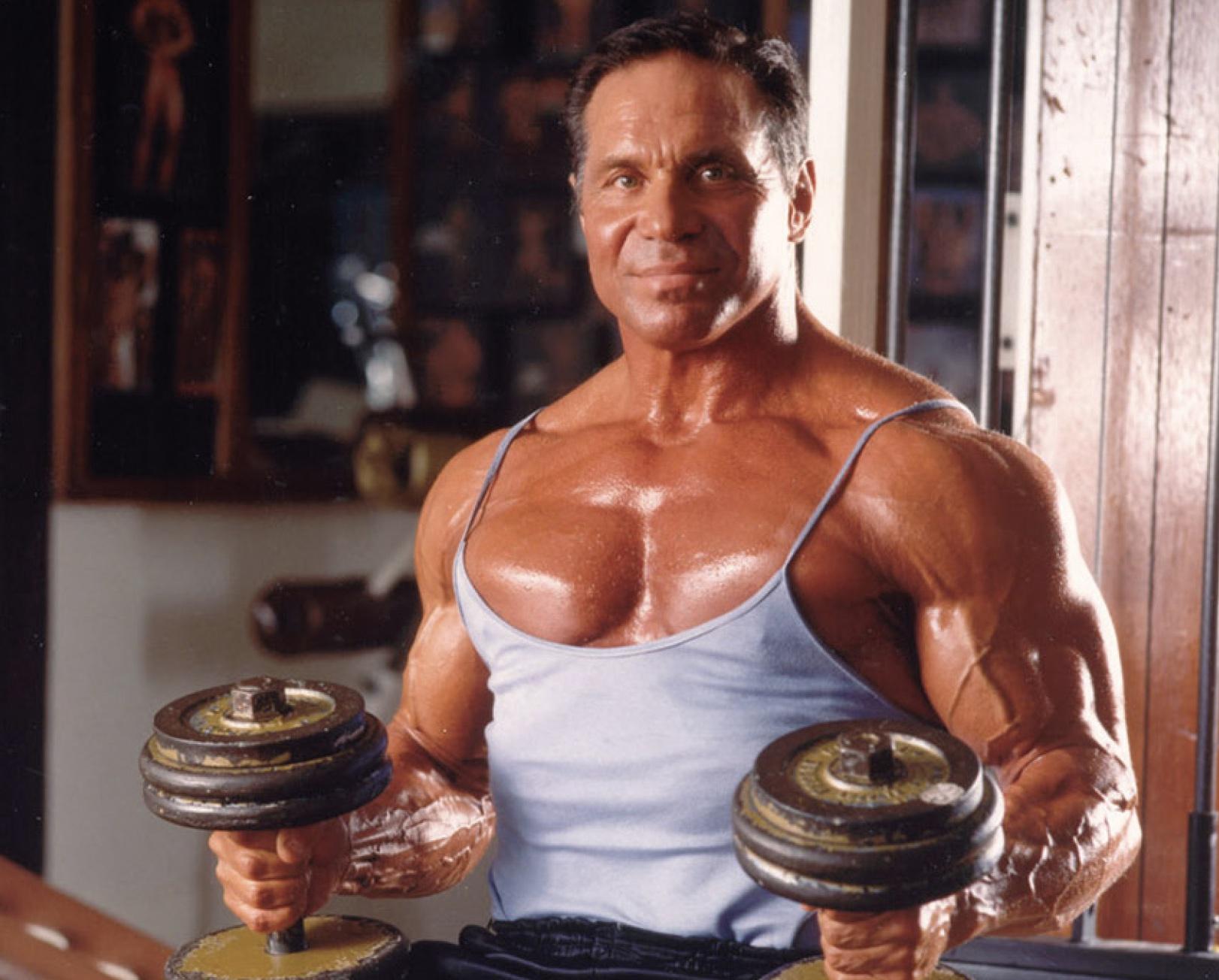

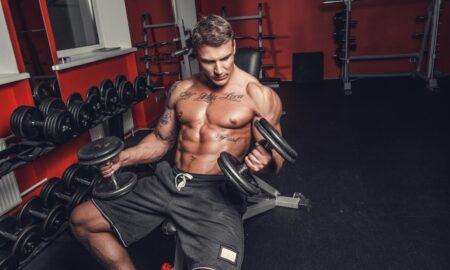
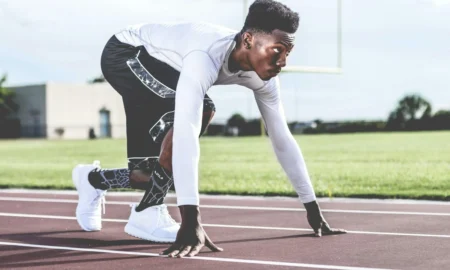


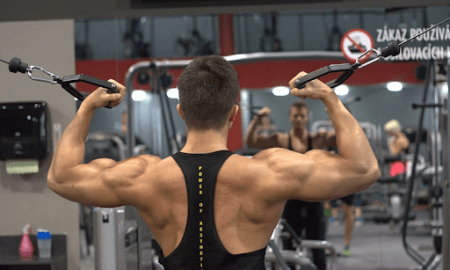
You must be logged in to post a comment Login